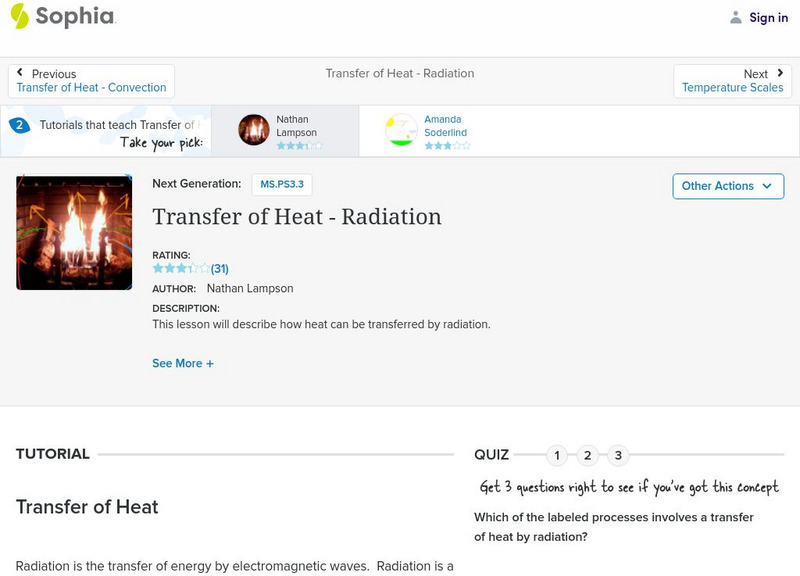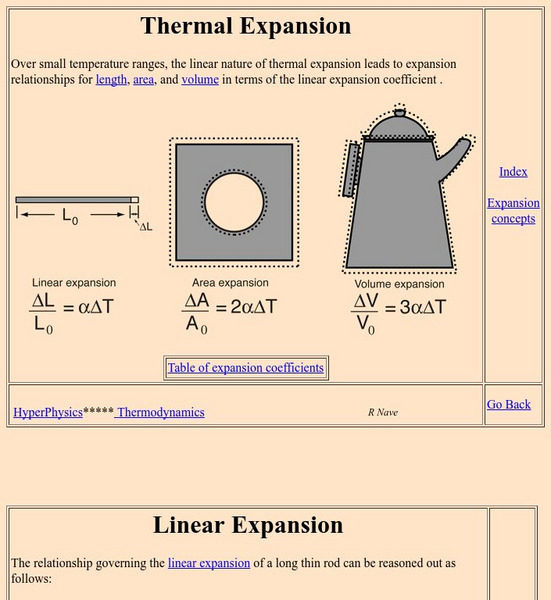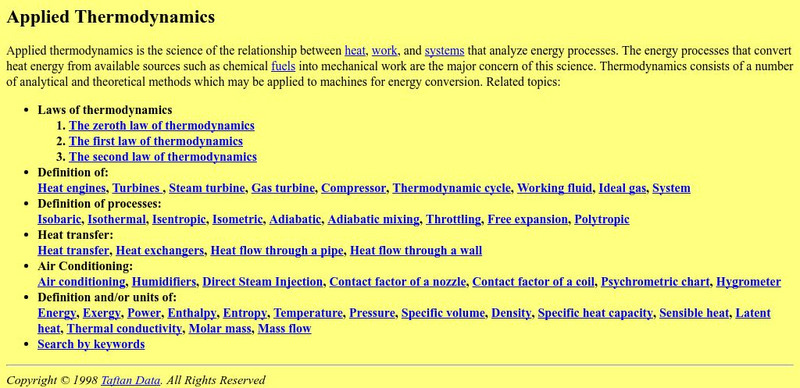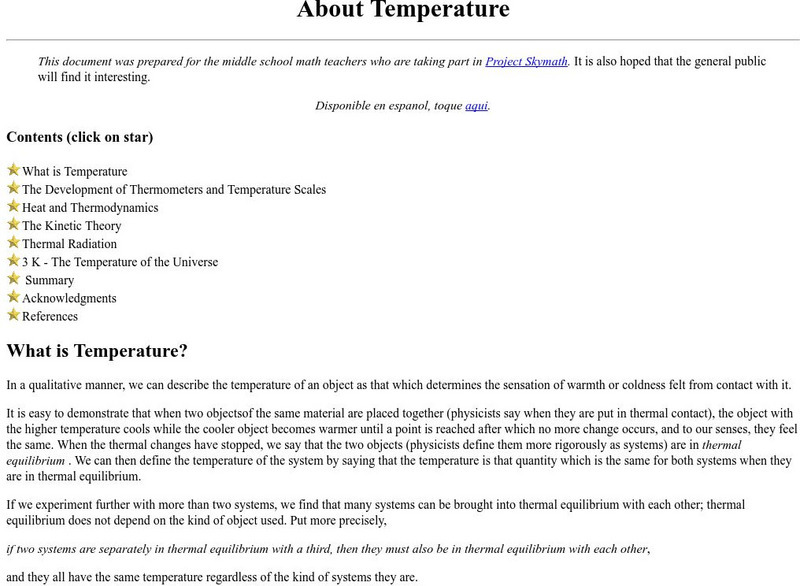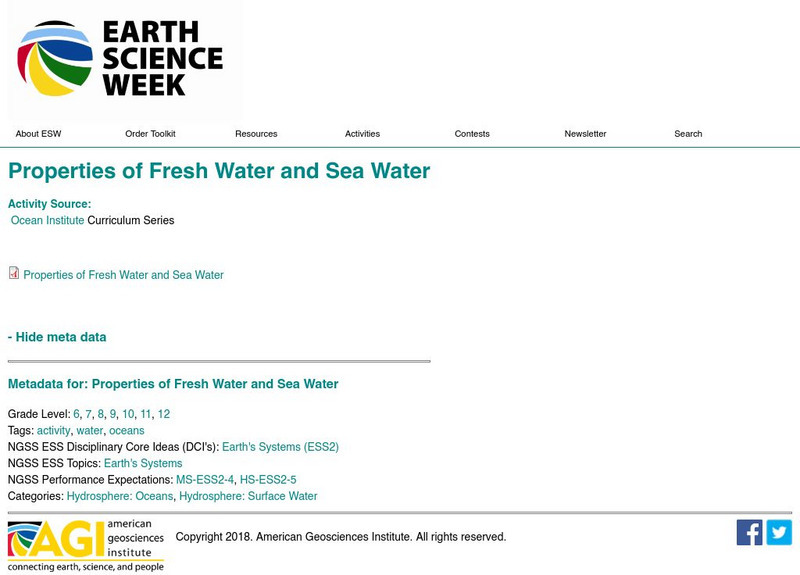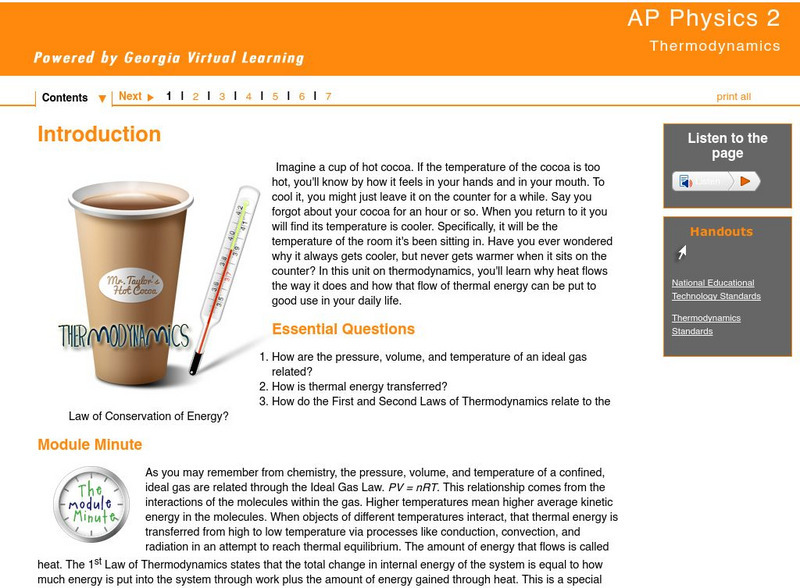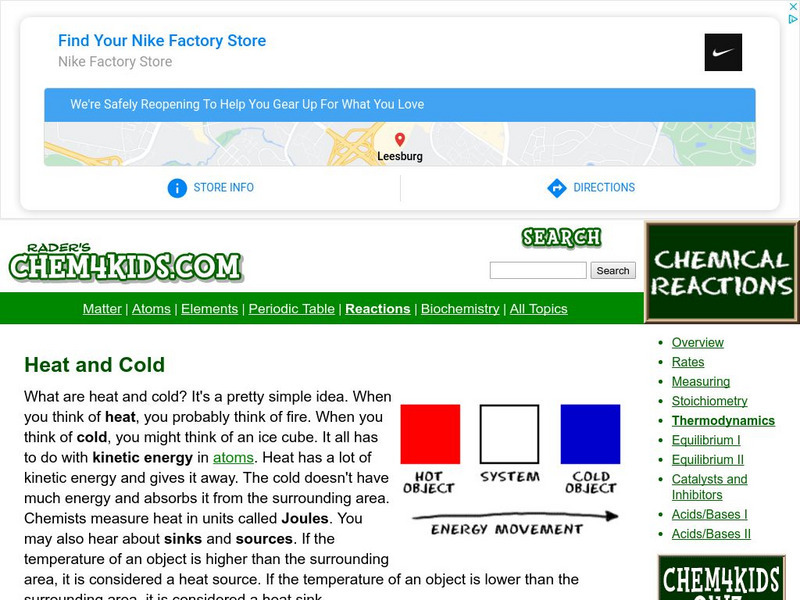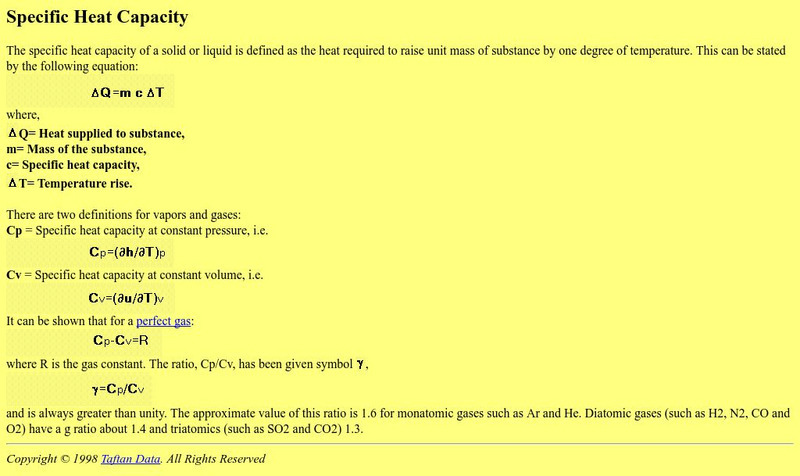Sophia Learning
Sophia: Transfer of Heat Radiation: Lesson 2
This lesson will describe how heat can be transferred by radiation. It is 2 of 2 in the series titled "Transfer of Heat - Radiation."
Sophia Learning
Sophia: Transfer of Heat Radiation: Lesson 1
This lesson will describe how heat can be transferred by radiation. It is 1 of 2 in the series titled "Transfer of Heat - Radiation."
Georgia State University
Georgia State University: Hyper Physics: Expansion Concepts
An indexing page from Georgia State University Physics Department which includes links to various other pages with information pertaining to thermal expansion. From expansion coefficients to equations to calculation and practice pages,...
Georgia State University
Georgia State University: Hyper Physics: Bimetallic Strips
The operation of bimetallic strips is explained and illustrated. The principle of thermal expansion is related to their operation. A link to applications of bimetallic strips is provided.
Other
Taftan: Applied Thermodynamics
A definition of applied thermodynamics, the science of the relationship between heat, work, and systems that analyze energy processes. Related links.
University Corporation for Atmospheric Research
Ucar: About Temperature
This site from the University Corporation of Atmospheric Research provides a lengthy page covering numerous topics including the difference between heat and temperature, the use of different temperature scales, thermal expansion, how a...
Other
Warmair.com: Programmable Thermostats
The virtues of programmable thermostats are discussed. Includes a section titled "Thermostat Set-back Calculation;" the visitor can enter the normal and an adjusted thermostat setting and an outdoor temperature and view the percent...
Georgia State University
Georgia State University: Hyper Physics: First Law of Thermodynamics
At this site from Georgia State University the first law of thermodynamics is stated and explained. The meaning of internal energy and enthalpy is discussed. Equations are given and the importance of a system analysis is discussed.
Museum of Science
Museum of Science and Industry: Online Science: Get the Porridge Just Right
Step-by-step illustrated instructions for an experiment investigating the loss of heat in three bowls of porridge.
Indiana University
Indiana University Bloomington: Geo Notes: Geothermal Resources in Indiana [Pdf]
Describes how geothermal energy is harnessed in Indiana.
American Geosciences Institute
American Geosciences Institute: Earth Science Week: Properties of Fresh Water and Sea Water
Students set up three demonstrations to observe the properties of water. They explore the boiling point of water, the freezing point of water, and the ability of water to store heat.
Georgia Department of Education
Ga Virtual Learning: Thermodynamics
In this interactive unit on thermodynamics, you'll learn why heat flows the way it does and how that flow of thermal energy can be put to good use in your daily life.
Chem4kids
Chem4 Kids: Thermochemistry
This site provides a general overview of thermochemistry, the division of chemistry that deals with temperature in chemical reactions. Content explores what heat and cold really are, the heat and energy around you, and a bit about Lord...
CK-12 Foundation
Ck 12 Exploration Series: Simulations: Physics: Hot Oven
[Free Registration/Login Required] Do you know why the metal in the oven burns your skin but the air in the oven doesn't? This simulation will show you the relationship between heat energy and temperature.
Other
Applied Thermodynamics: Specific Heat Capacity
Specific heat capacity is defined and explained at this site from Applied Thermodynamics. An equation is given. The general equation for the specific heat of an ideal gas is derived and discussed.
Physics Classroom
The Physics Classroom: Thermal Physics: Thermometers as Speedometers
Through interactive exercises and illustrated tutorials, students answer the fundamental questions: What is the reading on a thermometer the reflection of? What does temperature measure?
Physics Classroom
The Physics Classroom: Thermal Physics: Calorimeters and Calorimetry
Students learn about calorimeters and calorimetry in this illustrated, interactive physics tutorial.
American Chemical Society
Middle School Chemistry: The Ups and Downs of Thermometers
Based on experimental observations, students describe, on the molecular level, why the liquid in a thermometer goes up when it is heated and down when it is cooled.
University of Colorado
University of Colorado: Ph Et Interactive Simulations: Reversible Reactions
Watch a reaction proceed over time. How does total energy affect a reaction rate? This model represents an analogy of chemical reactions.
Climate Literacy
Clean: Climate Change and the Oceans
Students discover the role that the oceans play in climate change, and how climate change affects the oceans. It is lesson eight in a nine-lesson module "Visualizing and Understanding the Science of Climate Change."
Other
Applied Thermodynamics: Heat Transfer
Heat transfer, rates of heat exchange,conduction, radiation and convection are defined and discussed at this site from Applied Thermodynamics. Well illustrated.
US Energy Information Administration
U.s. Eia Energy Kids: Energy Units Basics
Instructions for converting the physical measurements of different types of fuels, such as gallons or barrels, to British thermal units (Btu), allowing for cross-comparison.
Concord Consortium
Concord Consortium: Stem Resources: Greenhouse Light and Temperature
An interactive tool where students can create a model of a greenhouse and use a light sensor to measure the amount of light it receives from a lamp at various times of the day. Temperature is also measured. Data is plotted on graphs,...
American Chemical Society
Middle School Chemistry: Chemical Reactions & Engineering Design
This lesson begins with a story about rescuing reptile eggs from a new construction site. Using the story as motivation, students are presented with an engineering design challenge: Build a portable device which can warm, support, and...



